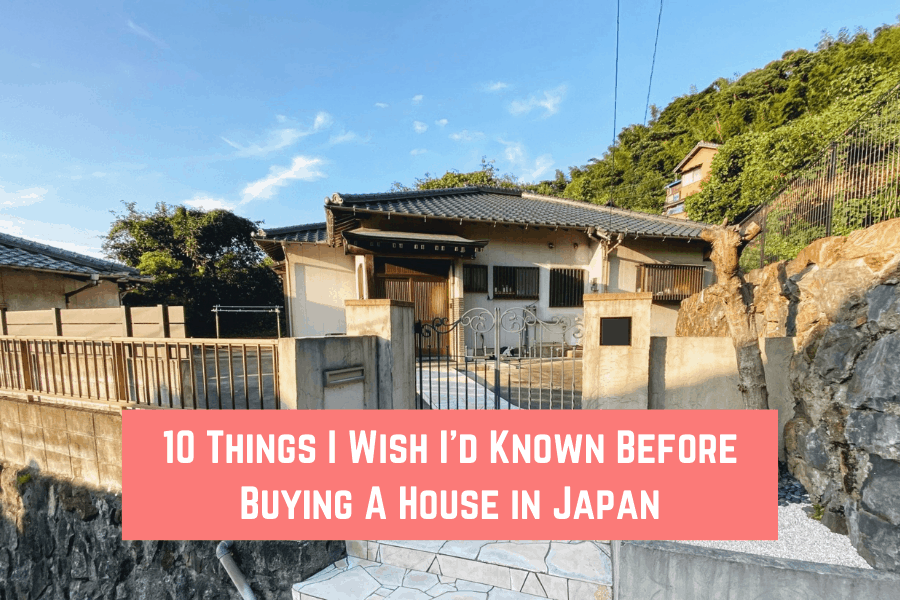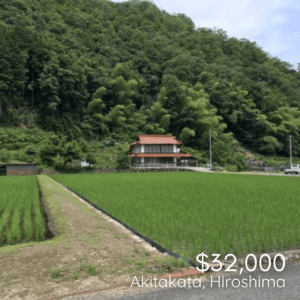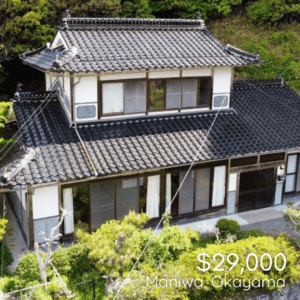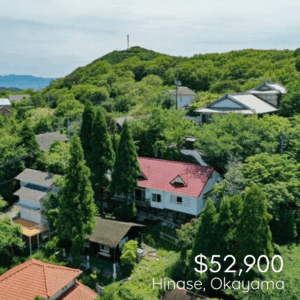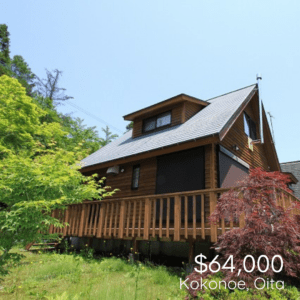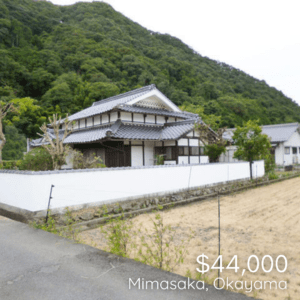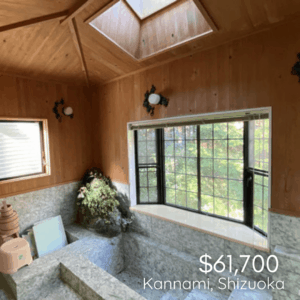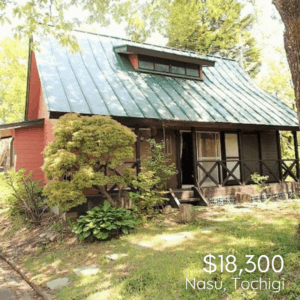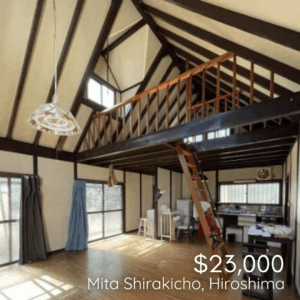Buying a house in Japan was my dream for many years, and I finally made it a reality.
The whole process involved a ton of research and trial and error. While it was an incredible learning experience for me, there are certain things I wish I’d known from the start. So I thought I’d write an article with some advice.
Here are the 10 most important things I wish I’d known before buying a house in Japan.
1. Don’t look at it as an investment.
While buying a house in Japan could well be considered an ‘investment in joy’, it’s not likely to make you money in the long term — especially a house in the countryside.
Japan’s real estate market is different from other countries, in that house values trend downwards over time, especially outside of the major city centers (Toyko, Osaka, Sapporo, Fukuoka…)
There are many reasons for this, including construction standards, an aging / declining population, migration to bigger cities, and a preference for new homes over ‘used’.
In other words, if you’re planning to buy a house in the Japanese countryside as a quick flip, or even to sell in the future for your retirement fund, you’ll likely be disappointed in the results.
Related: Should you buy an Akiya?
That said, if you’re okay with thinking about it as a lifestyle upgrade and not an investment, I can’t think of anywhere else in the world where you can get as much value for your money.
Buying a house to live in year round (assuming you’ve got the visa thing figured out), or as a vacation home for a few visits a year, is highly recommended.
2. Have the cash on hand.
Unless you’re a resident with a well-paying job in Japan, it’s going to be near impossible to get a mortgage. So you’ll likely be looking at buying with cash or financing from your home country.
And since you’re not looking at this as an investment but as a lifestyle upgrade (you read #1 right?), then you should ideally be in a position where you won’t miss the money you spend buying the house. In other words, you don’t want to spend your last $40k on a house in Japan.
Paying with cash will also give you some incredible bargaining power. I was able to shave about 20% of the list price by making a cash offer. By considering how long the property has been on the market and how motivated the sellers are, you can often turn a good deal into a great deal.
3. Consider buying something 'newer.'
I know people love the idea of a kominka in the countryside, and I do as well. The giant tatami rooms, an engawa overlooking a beautiful Japanese garden, intricately carved ranma… It’s the dream right?
So why did I buy a newer house?
I realized that an older, traditional house would be much more work and also more expensive and time consuming to maintain.
This is especially true if you plan to use it only as a vacation home.
If I wanted to maximize my vacation time in Japan every year, did I really want to be spending every waking hour working on the house? In the end, I decided I’d rather find a newer house that I could move into right away and that needed minimal work.
That said, there are plenty of cases where it still makes sense to buy a kominka. For example, if you’re able to live in Japan full-time and have the skills / money to make it work, maybe you should give it a shot 😉
4. Increase your budget.
Related to buying a newer house, I’d like to suggest that increasing your initial purchase budget may actually save you money in the long term.
How so?
If you consider repair and maintenance costs, and potential resale value (though remember, we’re not counting on this), then buying a newer, better condition house will likely be cheaper to maintain than an old akiya.
A simple example might look something like this:
$40,000 house + $3,000 renovation/maintenance costs in the first 5 years. Total = $43,000
vs
$15,000 house + $40,000 renovation costs before you can even move in. Total = $55,000
5. Plan for ongoing expenses.
It’s tempting to think that once you’ve bought the house, your costs will drop to zero since you’re not paying monthly rent.
In reality, there are some ongoing costs to consider and plan for:
Utilities:
Of course when you’re staying in the house, you’ll need to pay utilities.
According to JapanGuide, the average cost for utilities for one person is just under 10,000 yen a month: about 4000 yen for electricity, 3000 yen for gas and 2000 yen for water.
When you’re away for an extended period, you should be able to pause or shut down utilities, depending on your contract. In my case, I pause my water contract, and for electricity I pay about 1000 yen per month (the base rate) because I’m on a longer contract. (My house is all-electric, so I don’t have a gas hook-up)
Property Taxes:
Property taxes are around 1.4% of the assessed house / land value per year. I pay about $500 per year on mine.
Insurance:
Fire insurance starts at $200-400 per 2-year contract. It’s not mandatory, so it will be up to you to do the cost-benefit analysis.
Maintenance:
Maintenance costs very much depend on the individual house. My house was in really good condition, so I’ve only spent about 15万円 on renovations (new tatami mats, fusuma, and a quick roof fix).
The most important thing is to pay for a building inspection before you buy the house (5万円-7万円). He’ll tell you what work needs to be done and even give you a rough estimate of costs. (Also see #8 below)
Property Management:
Unless you have a close friend living nearby, you’ll likely need someone to come by periodically when you’re not there to air out the house, cut the grass, etc. These options vary by locality and can range anywhere from 3,000 to 10,000 yen per hour, but the price can balloon if you need an English speaking manager in a touristy area (Niseko for example).
6. View the house in person.
While it might be tempting to pull the trigger and purchase a house remotely (yes, it’s possible — see #9 below), I would highly recommend viewing the house in person.
While most Japanese real estate sites aren’t that sophisticated with their photography (to be honest, a lot of the photos are pretty poor!), photos of a property don’t always tell the full story.
It’s important to get a ‘feel’ for the house, imagine yourself spending time there. Almost as important is to see what the surrounding area is like. Some examples:
- Try saying hi to the neighbors. Do they seem friendly?
- What are the public transport options like? How often do the buses or trains come?
- Why is every other house nearby an akiya? Are there any young people that live nearby?
- And most importantly: Will that ugly floor tile in the bathroom eventually drive me crazy?
While the current travel restrictions make it difficult (if not impossible) to visit Japan at the moment, it’s probably worth waiting to find that property that’s perfect for you.
7. Hire a building inspector.
Fixing structural, plumbing, electrical, and roofing issues can get extremely expensive in Japan. They also often remain hidden to the untrained eye, so your best bet is to hire a building inspector before making an official offer on any house.
Especially in the case with older buildings, a building inspector should be your trusted ally.
The cost of an inspection is usually around 50,000 to 70,000 yen, and he or she will provide you with a written report about the condition of the house (in Japanese). I’d also highly recommend going in person to watch them do the inspection (I did this and learned a lot!), so they can point out useful things that may not be covered in the report.
8. Be flexible.
When I started looking for a house in Japan years ago, I really thought I’d buy a beautiful old kominka in the countryside. That was the dream.
But as I looked at more and more properties and did more research, I saw houses that were outside my criteria but offered unique benefits.
The house I eventually bought is less than 30 years old and isn’t even in the countryside, but I was able to see that it offered a lot of value. For one, it was less than half of my budget of $70,000, it didn’t need much work, and it was near a small city where I had friends. It also had excellent public transit options — I wouldn’t even need a car. Plus I could walk to the konbini and supermarket.
If I had been more set on a particular style or type of house, I think I would have overlooked the one I ended up buying. I’m very happy with my house, and honestly I wouldn’t change anything!
9. Hire an intermediary.
After speaking with a few subscribers, I realized how difficult it can be to buy a house in Japan with limited Japanese ability (I’m just about at N1 level on the JLPT and even I had some difficulty!). I even heard about how many real estate agents will dodge your emails or calls just because they are not comfortable working with foreigners.
I decided I needed to do some more research to come up with a good solution. So, I’ve spent the last few weeks interviewing English speaking real estate agents and property managers in Japan over Skype!
While most agencies were focused on high-end foreign investment or vacation properties (think $500k and up), I’m happy to say that my favorite option also had the most reasonable pricing.
Nippon Tradings International is run by husband and wife team Ziv and Chikako Nakajima-Magen. Their company acts as an intermediary between an agent and the foreign buyer.
They deal with all Japanese communication with the agent, search for properties, arrange inspections, help with due diligence, and can even help you purchase from overseas. They also offer full property/portfolio management services for investment properties, holiday properties owned by non-residents who reside overseas for most of the year, or even for Japan residents who simply don’t have the language skills, bandwidth or inclination to deal with management on their own.
I really wish I’d known about them when I bought my house a few years ago. I would have gladly saved the headaches of doing it on my own.
Ziv is also the creator / host of the Japan Real Estate Podcast, which is an incredible resource for anyone looking at buying in Japan. I’ve almost listened to all of their episodes! 110% recommended listening.
I’ll also go out on a limb and say that — unless you have a Japanese husband or wife — hiring an English speaking intermediary will actually save you money, despite the extra fees. You’ll have access to better priced (ie. locally-aimed) properties that you won’t find on English-oriented real estate sites, and they’ll help you avoid expensive mistakes.
If you’re serious about buying and would like an introduction, Ziv has kindly offered Cheap Houses Japan newsletter subscribers 10% off their fees (!!) on their first real estate purchase. You can contact me for the discount and an email introduction.
10. Subscribe to the Cheap Houses Japan Newsletter
So now that you’ve increased your budget a little, have realistic expectations, and are flexible to consider different properties, what’s next?
How about joining the Cheap Houses Japan Newsletter? 😉
I’d love to send you 10 of the best Japanese real estate deals listings every week. Most deals are under $100k — and some are as low as $30k or even $20k.
The properties I include in the newsletter represent excellent value: if they’re older homes, they often feature renovated modern bathrooms and kitchens, or at the very least are ready to move in.
I also scout for houses near the major cities (especially Kyoto and Tokyo) and with good train access. For example, within 1 hour by train from Shinjuku for less than $100k. (If you’ve ever looked for houses in Tokyo, you know how difficult this is!)
Here are a few examples of recent homes in my newsletter:
Why did I start this newsletter? For one, I love Japanese houses. For as long as I can remember, it was my dream to own a house in Japan. After researching for years and viewing many houses, I finally pulled the trigger and bought a house a few years ago. It’s been an absolute joy to own the house, and I really want to help other people realize their dream of owning a house in Japan — one that doesn’t bankrupt them with renovation costs!
To learn more about the Cheap Houses Japan Newsletter, click the button below:
